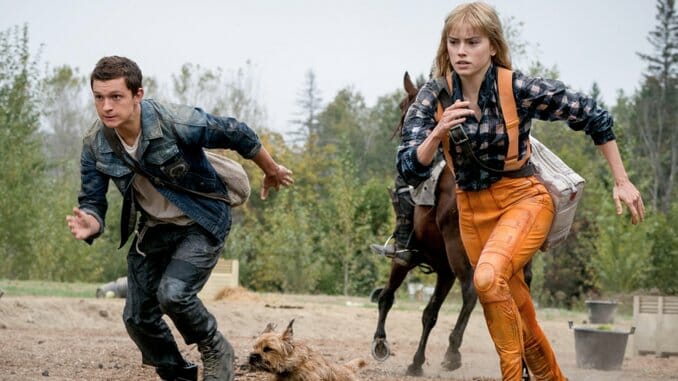Will Chaos Walking Live up to the Urgency of the Novels?
Patrick Ness’ sci-fi trilogy was more than an adventure tale. How will the movie handle it?

“If you ever see a war…you’ll learn that war only destroys. No one escapes from a war. No one. Not even the survivors. You accept things that would appall you at any other time because life has temporarily lost all meaning.” — The Ask and the Answer
“War,” says Mayor Prentiss, his eyes glinting. “At last.” — Monsters of Men
Movies based on young adult sci-fi and fantasy novels have been a mixed bag at the movies since the Harry Potter franchise convinced every studio exec that any glossy cover on the shelves in your local library’s Teen Zone could be the next billion-dollar franchise. It is charitable to say that most of them have not been very good.
The long, long wait for Chaos Walking, based on a sci-fi trilogy by Patrick Ness, doesn’t exactly fill me with confidence that this stab at hitting YA adaptation gold will fare any better. News of major reshoots (from three years ago!) is usually a good indication that a movie is going to be troubled. With the pandemic derailing everybody’s release schedule, it’s now hard to tell how much of Chaos Walking’s long stint in post-production has to do with any script problems.
It sure would be nice if the movie were good, though, because Ness’ trilogy, which began in 2011 with The Knife of Never Letting Go, is a powerful and imaginative story told unforgettably. It’s completely accessible to its target readership while tackling truly unsparing subject matter that touches on every vitally important social question we’re struggling with literally right now: Sexism, toxic masculinity, war and political violence, the inhumanity of colonization. Fans of the book deserve an adaptation with teeth.
The Noise is a man unfiltered, and without a filter a man is just chaos walking.
The series is set on a distant planet in a far off future where humanity has begun colonizing other worlds. The planet the young Todd finds himself on imparts the ability to broadcast one’s thoughts to others—an ability given to local fauna and humans alike—which characters refer to as “Noise.” It’s the central gimmick of the book, and Ness gets points for thoroughly thinking through all the ways in which this would absolutely make life weird and unbearable. Learning in a classroom is basically impossible, Todd reflects at one point, because you cheat even if you don’t mean to…“and everybody means to.” Hilariously (and often touchingly), we hear the internal monologues of animals, too: As Todd informs us in the opening, the thing you learn about dogs is that they have nothing of importance to say beyond “Poop!” and “Squirrel!” A particular type of indigenous herd animal keep themselves in formation by thinking a thought that the humans interpret simply as a soft, reassuring “Here.” The babel of thoughts that come from crowds of people is often represented on the page by jumbles of script in a myriad of jagged typefaces.
-

-

-

-

-

-

-

-

-

-

-

-

-

-

-

-

-

-

-

-

-

-

-

-

-

-

-

-

-

-

-

-

-

-

-

-

-

-

-

-








































